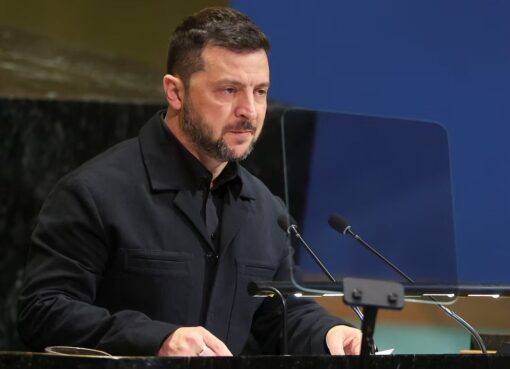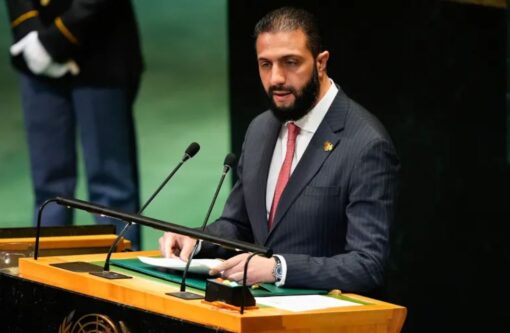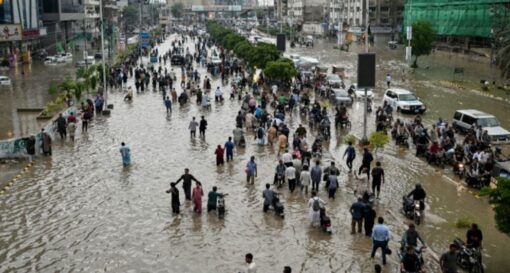Ukraine and Syria have formally restored diplomatic relations in a landmark move that unfolded on the sidelines of the United Nations General Assembly in New York.
The development signals a dramatic shift for both nations, who had severed ties three years ago during the rule of Syria’s former president Bashar al-Assad.
Ukrainian President Volodymyr Zelenskyy announced the agreement after a bilateral meeting with Syria’s interim leader Ahmed al-Sharaa, describing the step as one rooted in “mutual respect and trust.”
The renewal of relations came through the signing of a joint communiqué, attended by senior officials including Syria’s Foreign Minister Asaad al-Shaibani and Ukraine’s diplomatic team.

“We welcome this important step and are ready to support the Syrian people on their path to stability,” Zelenskyy wrote on X after the meeting.
He added that discussions with President al-Sharaa covered “promising sectors for developing cooperation, security threats faced by both countries, and the importance of countering them.” Both leaders agreed that rebuilding official ties could pave the way for trade, investment, and joint initiatives aimed at stabilizing their respective regions.
For Syria, this marked its first presidential-level presence at the UN General Assembly in nearly sixty years. The country had boycotted the annual gathering since 1967, following Israel’s occupation of the Golan Heights.
The last Syrian head of state to attend the session was Nureddin al-Atassi, who served as president from 1966 to 1970. Al-Sharaa’s arrival in New York therefore carried deep symbolic weight, not just for his nation but also for the broader Middle East, as Damascus seeks reintegration after decades of conflict and authoritarian rule.
Al-Sharaa assumed power in January after opposition forces toppled the Assad regime, bringing an end to nearly five decades of rule by the Assad family.
His participation in the UNGA has been framed as a debut on the international stage, where he has pledged reforms, new institutions, and steps toward free elections. In his speech earlier this week, he called on the global community to lift crippling sanctions on Syria and invited foreign investors to support reconstruction efforts.
He presented his leadership as a break from the past, emphasizing that the post-Assad government aims to restore Syria’s reputation as a sovereign state committed to rebuilding.
The diplomatic thaw with Ukraine represents one of the first significant foreign policy milestones of his presidency. It also serves as a symbolic reversal of Assad’s stance in 2022, when his government severed relations with Kyiv after recognizing the so-called independence of the Russian-backed breakaway regions of Donetsk and Luhansk.
That move had aligned Syria firmly with Moscow’s foreign policy, leaving Ukraine with little choice but to cut ties in retaliation. For Zelenskyy, who has consistently warned that Russia’s aggression against Ukraine is only the beginning of a wider expansionist agenda, Syria’s new approach may help weaken Moscow’s influence in the region.
At the UN, Zelenskyy positioned the development as part of a broader push for global unity against aggression and instability.
“Our relations will now be built on the basis of respect, not coercion,” he told delegates, framing the restoration of ties as proof that even former adversaries can find common ground when sovereignty and peace are respected.
The Ukrainian president also reiterated his call for international support for Syria’s transition, highlighting that Kyiv understands the costs of conflict and sanctions and does not wish to see another nation suffer prolonged isolation.
Analysts note that this rapprochement could alter regional dynamics in several ways. First, it may encourage other states in the Middle East and beyond to re-evaluate their positions toward Ukraine, especially in light of Russia’s ongoing war.
Second, it could strengthen Syria’s case for gradual reintegration into global diplomacy, potentially softening its pariah status. And third, it demonstrates al-Sharaa’s willingness to distance himself from Moscow in order to rebuild ties with countries that had previously opposed Assad.
For Ukraine, the timing is strategic. The country continues to seek international allies at a moment when Russia has intensified its assaults and is attempting to stretch Western resolve.
By bringing Syria back into the fold, Kyiv not only signals diplomatic flexibility but also gains a symbolic victory against Russia’s efforts to monopolize influence in the Middle East.
Ukraine’s outreach to Syria highlights Zelenskyy’s strategy of countering Russian narratives by engaging states that were once aligned with Moscow.
The Syrian delegation in New York was keen to underline that the move was not just political theater. According to official statements, Syria views Ukraine as a partner in economic development, agriculture, infrastructure, and technology.
The Syrian Foreign Ministry described the talks as “constructive and forward-looking,” emphasizing that rebuilding diplomatic channels opens opportunities for shared initiatives.
In Damascus, state media framed the agreement as proof that the new leadership is capable of repairing relationships that had been broken under Assad’s rule.
For Syrians, the announcement also carried domestic importance. Millions of citizens, weary from years of war, sanctions, and displacement, saw in it a rare moment of international recognition.

The United Nations estimates that over seven million Syrians remain displaced internally, while another six million live as refugees abroad. With a million already returning home since Assad’s fall, the restoration of ties with Ukraine may boost confidence that Syria is gradually rejoining the world community.
Still, significant challenges remain. Al-Sharaa’s call for a complete lifting of sanctions has met with skepticism among some Western nations, who argue that meaningful reforms must precede relief.
Human rights groups continue to press for accountability for crimes committed during the Assad years, and skeptics warn that the momentum of early diplomatic wins should not obscure the long road to democratic governance.
Ukraine, too, faces its own existential struggle, with Russian forces entrenched in occupied territories and pressure mounting on Zelenskyy to sustain international backing.
Yet the optics of two nations, once divided by war and geopolitics, choosing reconciliation on the world’s biggest diplomatic stage is powerful.
At a time when the UN’s relevance is often questioned, the Syria–Ukraine agreement demonstrates that its platform still offers opportunities for meaningful breakthroughs.
As one European diplomat observed, “This was more than just a handshake. It was a declaration that history does not have to dictate the future.”
The restoration of diplomatic ties between Ukraine and Syria may not transform their immediate realities, but it lays the foundation for cooperation, stability, and mutual recognition.
It is a rare piece of good news at a gathering often overshadowed by crises, and it illustrates the enduring potential of dialogue over division. For both Zelenskyy and al-Sharaa, the decision to rebuild bridges rather than walls may prove to be one of the defining legacies of their leadership.


